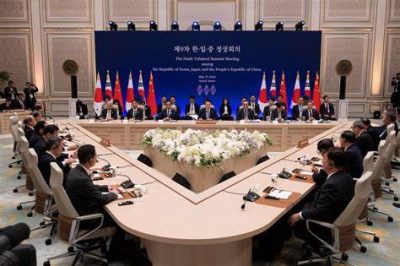Seoul, 27 May 2024 (WAI): At his first three-way meeting with their leaders in four years on Monday, Chinese Premier Li Qiang hailed a “restart” in relations with Japan and South Korea. And aimed to resume trade and security discussions hindered by international tensions.
The three-party free trade agreement discussions have been at a standstill since 2019. The Chinese Premier met with South Korean President Yoon Suk Yeol and Japanese Prime Minister Fumio Kishida and discussed revitalizing these negotiations.
Li urged the complete restoration of collaboration amongst East Asia’s economic giants. Furthermore, he described the summit as “both a restart and a new beginning” as it got underway.
The Chinese Premier stated, “China will maintain Close ties with South Korea and Japan. The spirit of cooperation achieved through crisis response will remain the same. Furthermore, our mission to safeguard regional peace and stability will not change.”
The summit was viewed as a sign of development for the three nations.
Leif-Eric Easley, a professor at Seoul’s Ewha University, said, “Reducing tensions is more important to the trilateral meeting than changing the course of geopolitics.”
Amidst the competition between Beijing and Washington over democratically controlled Taiwan and North Korea’s nuclear program, South Korea and Japan are attempting to manage mutual hostility.
Yoon and Kishida have forged stronger ties with Washington and one another. Their ties led to an unprecedented three-way partnership on military and other matters.
The President of the United States, Joe Biden, has increased duties on various Chinese goods, such as computer chips and batteries for electric vehicles (EVs). His opponent in the November presidential election, Donald Trump, has proposed taxes on all Chinese goods of 60% or more.
Li stated, “We need to promote multipolarity worldwide and oppose the formation of blocs or camps. “
BOOSTING COOPERATION
China, Japan, and South Korea issued a joint declaration pledging to formalize frequent high-level communication. These states work together on various issues, including commerce, world peace, health, conservation, and climate change.
The proclamation aimed to increase the number of cultural, tourism, and educational interactions between people by 2030.
The leaders also released separate collaborative statements on pandemic preparedness and intellectual property protection.
Also Read: Impact of White Phosphorus use on Regional Climate
Yoon and Kishida made a call to Pyongyang over claims that the country is using ballistic missile technology even though UN Security Council resolutions have outlawed it.
North Korea’s effort to launch a satellite on Monday was unsuccessful due to an explosion during the flight of a rocket engine.
The three nations pledged to denuclearize the Korean peninsula. This pledge was denounced by North Korea, which described it as a “grave political provocation” that violated its sovereignty.
TRADE RELATIONS
The United States demands that its allies move their supply chains for critical products, like semiconductors, away from China, which has tested the already competitive trading relationship between China, South Korea, and Japan.
Yoon did not elaborate when stating that the leaders decided to create an environment for trade and supply chains that is transparent and predictable.
The leaders also attended a forum with leading business executives from the three nations, who acknowledged that the world’s challenges had prevented cooperation from reaching its full potential. Nevertheless, they agreed that industry would cooperate to promote trade and stabilize supply chains.
“Relations would advance further if China allows better access for Japanese and Korean diplomats in Beijing and improves the business environment for foreign companies,” Easley stated.
During their most recent free trade agreement negotiations in November 2019, the three nations decided to liberalize more trade-related sectors than the Regional Comprehensive Economic Partnership (RCEP), of which they are all members, including investment, e-commerce, customs, and trade of goods and services.

Atika Hassan is pursuing her MPhil in International Relations from University of the Punjab, Lahore, Pakistan. She loves to explore the fascinating world of international and domestic politics and can be reached out at atikahassan241@yahoo.com







